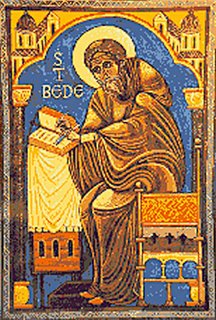 St Bede the Venerable, one of the great historians of the early Middle Ages.
St Bede the Venerable, one of the great historians of the early Middle Ages.Via Ted at The Late Adopter, an article on "revisionist history" by Joseph Zimmerman. Zimmerman commented on something scary I hadn't heard about. Apparently Florida governor Jeb Bush
It's hard to know where even to start with this, but Zimmerman does a good job of explaining the background of this bizarre piece of legislation. Once again, the conservative bugaboo raises its head: everything was fine until the 1960's, then:approved a law barring revisionist history in Florida public schools. "The history of the United States shall be taught as genuine history and shall not follow the revisionist or postmodernist viewpoints of relative truth," declares Florida's Education Omnibus Bill, signed by Gov. Jeb Bush. "American history shall be viewed as factual, not as constructed."
American historians supposedly started embracing newfangled theories of moral relativism and French postmodernism, abandoning their traditional quest for facts, truth and certainty.As Zimmerman points out, this story is itself revisionist history. Historians had realized that there is no history without interpretation long before. This is not "relativism" as conservatives try to portray it (no serious historian believes that one interpretation is as valid as another), but that catchword allows the conservatives to paint a simple dichotomy: liberals have no moral center, manipulate history, and teach our children lies about our noble founding fathers; whereas conservatives know there is one truth and one set of facts that need no interpretation. There are facts, a bible, and a constitution, and none of these things need interpretation -- they are clear and have always been understood they way we (conservatives) understand them now.
(As a side note, let me make it clear that I am referring not to the conservative intellectual tradition, but to the demagogues on the political right.)
One thing that seems to define the conservative mythos is the yearning for a golden age and an easily identifiable moment of corruption. For the people behind the Florida law, and for most of their fellow demogagues, that corruption clearly happened in the 60s (many Catholic traditionalists see it in Vatican II). Before then, it was all God and picket fences. If someone brings up the 50s that witnessed segregation, McCarthyism, terrible anxiety about nuclear weapons, and the Cold War, we are "revisionists."
Historical interpretation allows us to understand the complexities behind historical forces. Anyone who reads history this way will find it hard to swallow simplistic politics based delusions of "good guys" and "bad guys" dressed up as moral clarity. Where do policies like that lead us? Where have they led us in the past six years?

1 comment:
Halfway through my post I added the caveat about the more intellectual side of conservatism (Strauss is the best example) not because I didn't want to criticize it, but because I was talking about the more gut-level demagoguery which very much harkens back to a golden age (before there were immigrants, for example). Both types of conservatives are fundamentally ahistorical. In the case of golden agers, they: 1) look back to a time that never really existed, and 2) see history as static, i.e., there was a time "in illo tempore" where things were good, and then some form of corruption, some kind of original sin, created a dynamic in history and changed things (and change is always bad). No one who really knows anything about history could see things this way, history is always dynamic. (Incidentally, this kind of conservatism is not limited to politics or to people on the right: e.g., "rock n' roll meant something before Madonna"..."Baseball was great before steroids"... etc.)
I think the Straussians would like to think of themselves as independent of this, but in the end they work from a canon rooted in the past and their instincts, once they had to deal with history, would probably be to look backwards rather than forwards.
By the way, the "golden age" idea as applied to nationalism is explored very well by the medievalist Patrick Geary's "The Myth of Nations." He looks at how ideas about European nations always require one moment of definitive national acquisition that somehow is more real than all the other dynamic moments in the flux of history. I love that book.
Post a Comment